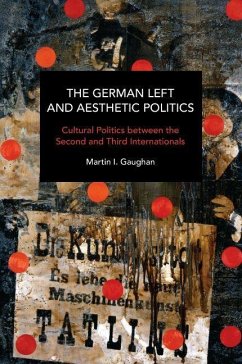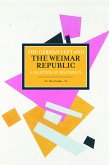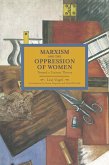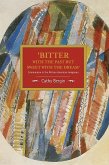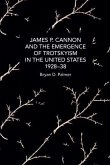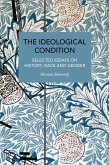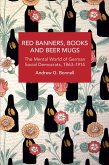Martin I. Gaughan
The German Left and Aesthetic Politics
Cultural Politics Between the Second and Third Internationals
Martin I. Gaughan
The German Left and Aesthetic Politics
Cultural Politics Between the Second and Third Internationals
- Broschiertes Buch
- Merkliste
- Auf die Merkliste
- Bewerten Bewerten
- Teilen
- Produkt teilen
- Produkterinnerung
- Produkterinnerung
The definitive exploration of aesthetic philosophy and practice on the German Left.
Andere Kunden interessierten sich auch für
![The German Left and the Weimar Republic The German Left and the Weimar Republic]() Ben FowkesThe German Left and the Weimar Republic36,99 €
Ben FowkesThe German Left and the Weimar Republic36,99 €![The Gramscian Moment The Gramscian Moment]() Peter D ThomasThe Gramscian Moment45,99 €
Peter D ThomasThe Gramscian Moment45,99 €![Marxism and the Oppression of Women Marxism and the Oppression of Women]() Lise VogelMarxism and the Oppression of Women35,99 €
Lise VogelMarxism and the Oppression of Women35,99 €!['Bitter with the Past But Sweet with the Dream' 'Bitter with the Past But Sweet with the Dream']() Cathy Bergin'Bitter with the Past But Sweet with the Dream'37,99 €
Cathy Bergin'Bitter with the Past But Sweet with the Dream'37,99 €![James P. Cannon and the Emergence of Trotskyism in the United States, 1928-38 James P. Cannon and the Emergence of Trotskyism in the United States, 1928-38]() Bryan D. PalmerJames P. Cannon and the Emergence of Trotskyism in the United States, 1928-3880,99 €
Bryan D. PalmerJames P. Cannon and the Emergence of Trotskyism in the United States, 1928-3880,99 €![The Ideological Condition The Ideological Condition]() Himani BannerjiThe Ideological Condition80,99 €
Himani BannerjiThe Ideological Condition80,99 €![Red Banners, Books and Beer Mugs Red Banners, Books and Beer Mugs]() Andrew G. BonnellRed Banners, Books and Beer Mugs35,99 €
Andrew G. BonnellRed Banners, Books and Beer Mugs35,99 €-
-
-
The definitive exploration of aesthetic philosophy and practice on the German Left.
Hinweis: Dieser Artikel kann nur an eine deutsche Lieferadresse ausgeliefert werden.
Hinweis: Dieser Artikel kann nur an eine deutsche Lieferadresse ausgeliefert werden.
Produktdetails
- Produktdetails
- Historical Materialism
- Verlag: Haymarket Books
- Seitenzahl: 284
- Erscheinungstermin: 25. Oktober 2022
- Englisch
- Abmessung: 226mm x 150mm x 18mm
- Gewicht: 436g
- ISBN-13: 9781642597837
- ISBN-10: 164259783X
- Artikelnr.: 63398790
- Herstellerkennzeichnung
- Libri GmbH
- Europaallee 1
- 36244 Bad Hersfeld
- gpsr@libri.de
- Historical Materialism
- Verlag: Haymarket Books
- Seitenzahl: 284
- Erscheinungstermin: 25. Oktober 2022
- Englisch
- Abmessung: 226mm x 150mm x 18mm
- Gewicht: 436g
- ISBN-13: 9781642597837
- ISBN-10: 164259783X
- Artikelnr.: 63398790
- Herstellerkennzeichnung
- Libri GmbH
- Europaallee 1
- 36244 Bad Hersfeld
- gpsr@libri.de
Martin I. Gaughan, a graduate of Trinity College Dublin in politics and economics, was awarded a PhD at the University of East Anglia, ('Berlin Dadaism and Constructivism', 1982). He is the author of German Art 1907-1937. Modernism and Modernisation (Peter Lang, 2007), and has contributed chapters to other publications.
Introduction
1 Franz Mehring: Literary Practice as a Socialist Form
1 A Portrait
2 Biographical Sketch
3 The Question of an Aesthetic Practice
4 Die Lessing-Legende
5 The Plays: ‘Minna von Barnhelm’ and ‘Emilia Galotti’
6 The Critique of Naturalism
2 Political Spontaneism and Cultural Practice
1 Political Spontaneism and Cultural Practice
2 The ‘Kunstlump’ Debate
3 Erste Dada-Messe (The First Dada Fair): ‘Die Kunst ist tot. Es lebe die
neue Maschinenkunst Tatlins’
4 Das Proletarische Theater
5 Franz Jung: Activist and Artist
6 Herzfelde’s ‘Gesellschaft, Künstler und Kommunismus’ (1922)
7 Art and/or Politics 1919–22
3 Märten and the Development of a Theoretical Position: From Reformism to
the November Revolution
1 The Historical Materialism Debate 1920–21
4 The ‘German October’ and Reconfiguration
1 The ‘German October’
2 Intellectuals and ‘the Second Culture’
3 Practice: From ‘Die Rote Gruppe’ to the ‘Assoziation revolutionärer
bildender Künstler Deutschlands’
4 Wittfogel’s Aesthetic Programme
5 Thalheimer’s Introductions to Mehring’s Oeuvre
5 Wittfogel’s Critique of Thalheimer’s Introduction
1 Zur Frage der marxistischen Ästhetik (On the Question of Marxist
Aesthetic)
2 Wittfogel’s Series
3 Becher: ‘Unsere Wendung’ (Our Turning Point)
4 Lukács and Die Linkskurve
5 Reportage or Portrayal
6 From the Second to the Third International: Lukács’s ‘Franz Mehring,
1846–1919’
7 ‘Nur-Kampfkultur oder positive Kultur’?
Conclusion
6 Crisis and Critique: Continuity and Conflict
Appendix: Towards a Materialist History of Art
References
Index
1 Franz Mehring: Literary Practice as a Socialist Form
1 A Portrait
2 Biographical Sketch
3 The Question of an Aesthetic Practice
4 Die Lessing-Legende
5 The Plays: ‘Minna von Barnhelm’ and ‘Emilia Galotti’
6 The Critique of Naturalism
2 Political Spontaneism and Cultural Practice
1 Political Spontaneism and Cultural Practice
2 The ‘Kunstlump’ Debate
3 Erste Dada-Messe (The First Dada Fair): ‘Die Kunst ist tot. Es lebe die
neue Maschinenkunst Tatlins’
4 Das Proletarische Theater
5 Franz Jung: Activist and Artist
6 Herzfelde’s ‘Gesellschaft, Künstler und Kommunismus’ (1922)
7 Art and/or Politics 1919–22
3 Märten and the Development of a Theoretical Position: From Reformism to
the November Revolution
1 The Historical Materialism Debate 1920–21
4 The ‘German October’ and Reconfiguration
1 The ‘German October’
2 Intellectuals and ‘the Second Culture’
3 Practice: From ‘Die Rote Gruppe’ to the ‘Assoziation revolutionärer
bildender Künstler Deutschlands’
4 Wittfogel’s Aesthetic Programme
5 Thalheimer’s Introductions to Mehring’s Oeuvre
5 Wittfogel’s Critique of Thalheimer’s Introduction
1 Zur Frage der marxistischen Ästhetik (On the Question of Marxist
Aesthetic)
2 Wittfogel’s Series
3 Becher: ‘Unsere Wendung’ (Our Turning Point)
4 Lukács and Die Linkskurve
5 Reportage or Portrayal
6 From the Second to the Third International: Lukács’s ‘Franz Mehring,
1846–1919’
7 ‘Nur-Kampfkultur oder positive Kultur’?
Conclusion
6 Crisis and Critique: Continuity and Conflict
Appendix: Towards a Materialist History of Art
References
Index
Introduction
1 Franz Mehring: Literary Practice as a Socialist Form
1 A Portrait
2 Biographical Sketch
3 The Question of an Aesthetic Practice
4 Die Lessing-Legende
5 The Plays: ‘Minna von Barnhelm’ and ‘Emilia Galotti’
6 The Critique of Naturalism
2 Political Spontaneism and Cultural Practice
1 Political Spontaneism and Cultural Practice
2 The ‘Kunstlump’ Debate
3 Erste Dada-Messe (The First Dada Fair): ‘Die Kunst ist tot. Es lebe die
neue Maschinenkunst Tatlins’
4 Das Proletarische Theater
5 Franz Jung: Activist and Artist
6 Herzfelde’s ‘Gesellschaft, Künstler und Kommunismus’ (1922)
7 Art and/or Politics 1919–22
3 Märten and the Development of a Theoretical Position: From Reformism to
the November Revolution
1 The Historical Materialism Debate 1920–21
4 The ‘German October’ and Reconfiguration
1 The ‘German October’
2 Intellectuals and ‘the Second Culture’
3 Practice: From ‘Die Rote Gruppe’ to the ‘Assoziation revolutionärer
bildender Künstler Deutschlands’
4 Wittfogel’s Aesthetic Programme
5 Thalheimer’s Introductions to Mehring’s Oeuvre
5 Wittfogel’s Critique of Thalheimer’s Introduction
1 Zur Frage der marxistischen Ästhetik (On the Question of Marxist
Aesthetic)
2 Wittfogel’s Series
3 Becher: ‘Unsere Wendung’ (Our Turning Point)
4 Lukács and Die Linkskurve
5 Reportage or Portrayal
6 From the Second to the Third International: Lukács’s ‘Franz Mehring,
1846–1919’
7 ‘Nur-Kampfkultur oder positive Kultur’?
Conclusion
6 Crisis and Critique: Continuity and Conflict
Appendix: Towards a Materialist History of Art
References
Index
1 Franz Mehring: Literary Practice as a Socialist Form
1 A Portrait
2 Biographical Sketch
3 The Question of an Aesthetic Practice
4 Die Lessing-Legende
5 The Plays: ‘Minna von Barnhelm’ and ‘Emilia Galotti’
6 The Critique of Naturalism
2 Political Spontaneism and Cultural Practice
1 Political Spontaneism and Cultural Practice
2 The ‘Kunstlump’ Debate
3 Erste Dada-Messe (The First Dada Fair): ‘Die Kunst ist tot. Es lebe die
neue Maschinenkunst Tatlins’
4 Das Proletarische Theater
5 Franz Jung: Activist and Artist
6 Herzfelde’s ‘Gesellschaft, Künstler und Kommunismus’ (1922)
7 Art and/or Politics 1919–22
3 Märten and the Development of a Theoretical Position: From Reformism to
the November Revolution
1 The Historical Materialism Debate 1920–21
4 The ‘German October’ and Reconfiguration
1 The ‘German October’
2 Intellectuals and ‘the Second Culture’
3 Practice: From ‘Die Rote Gruppe’ to the ‘Assoziation revolutionärer
bildender Künstler Deutschlands’
4 Wittfogel’s Aesthetic Programme
5 Thalheimer’s Introductions to Mehring’s Oeuvre
5 Wittfogel’s Critique of Thalheimer’s Introduction
1 Zur Frage der marxistischen Ästhetik (On the Question of Marxist
Aesthetic)
2 Wittfogel’s Series
3 Becher: ‘Unsere Wendung’ (Our Turning Point)
4 Lukács and Die Linkskurve
5 Reportage or Portrayal
6 From the Second to the Third International: Lukács’s ‘Franz Mehring,
1846–1919’
7 ‘Nur-Kampfkultur oder positive Kultur’?
Conclusion
6 Crisis and Critique: Continuity and Conflict
Appendix: Towards a Materialist History of Art
References
Index

